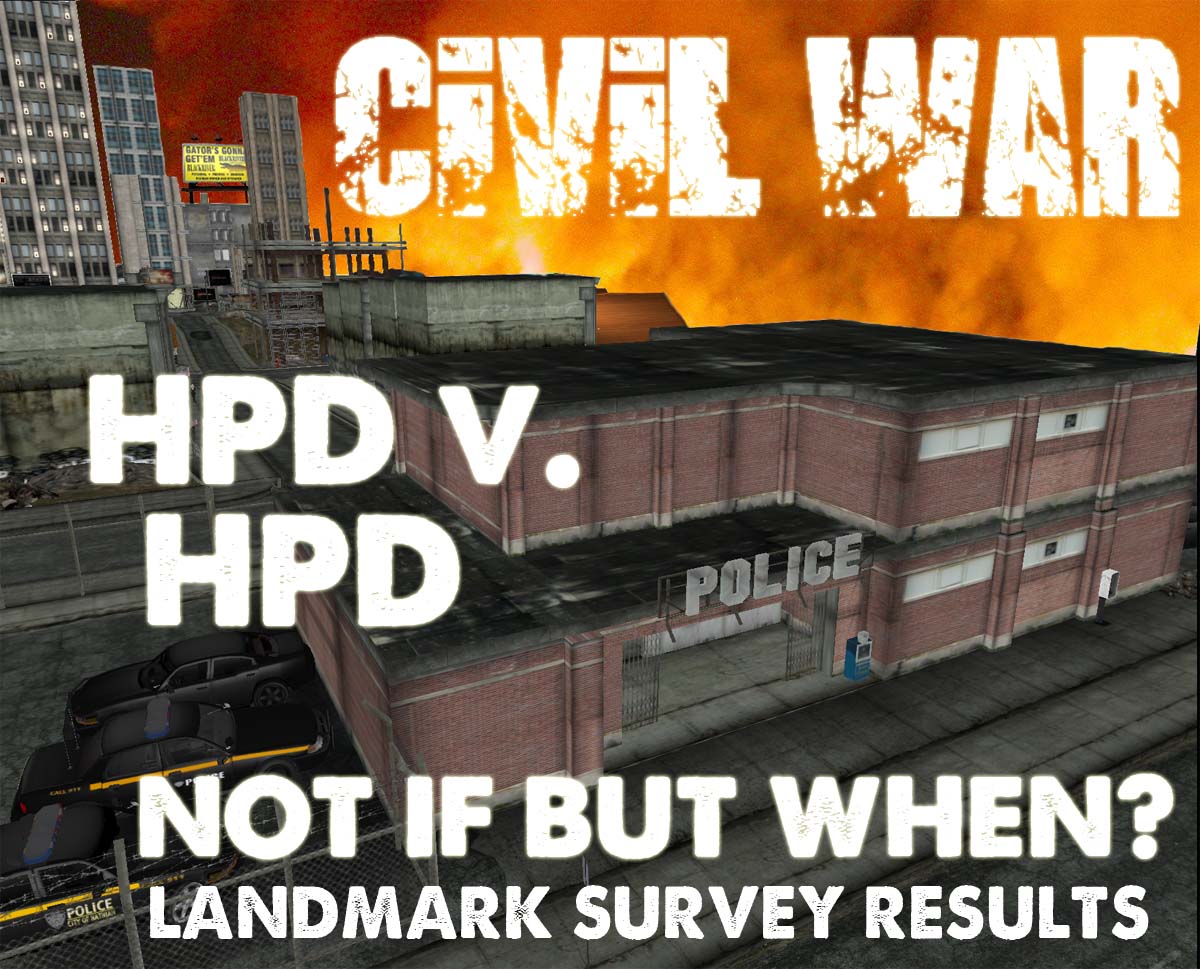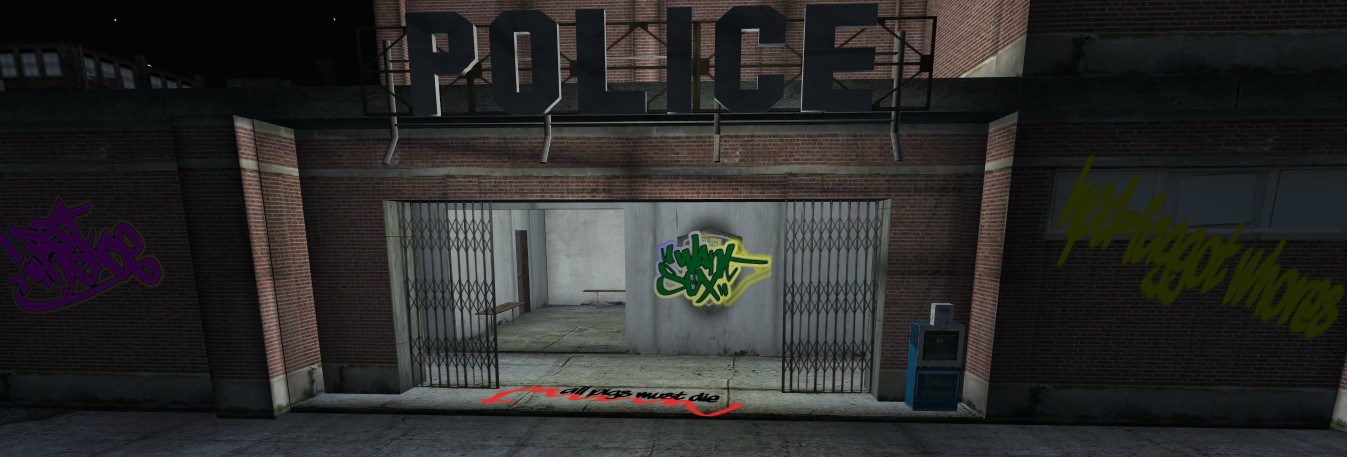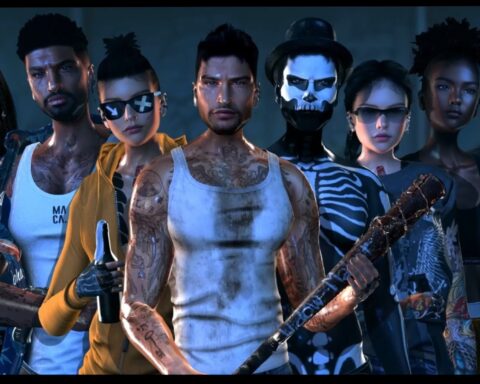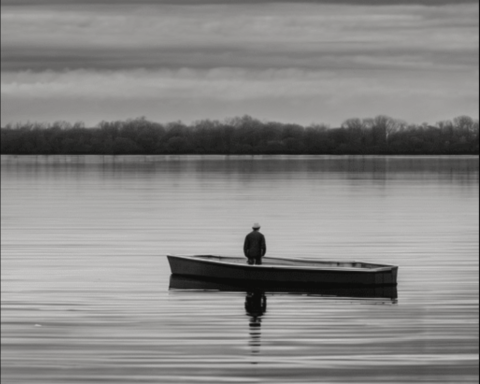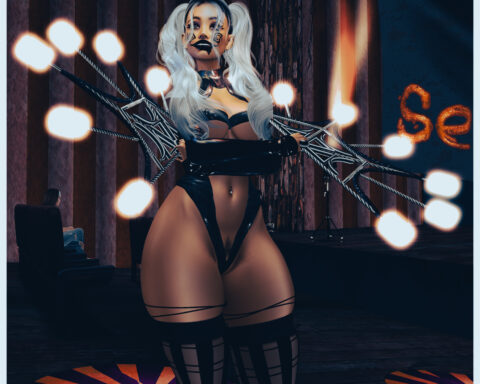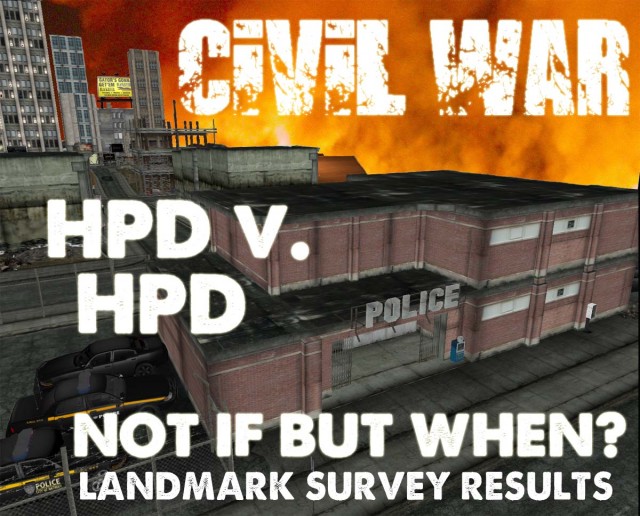
by Amberlynn Rain
Conflict over brutality within the Hathian Police Department is already seething toward the brink of an internal “civil war;” morale is low, and nobody thinks things are getting better. That’s the result of a landmark survey of HPD, FDH, and HGH Officers. Workers and volunteers will the HPD explode or melt down this spring and summer? According to some officers, the question isn’t “if”, but “when”, and the only question that remains unanswered is whether or not HPD leadership is aware of the deep seated resentments and has a plan…or can fabricate one…in time to head off a breakdown. Civil War?
The chances are good as we investigate in this Feature News Report.
((Editor’s Note: please note that this entire survey was conducted and is meant to be fully In Character and thus just roleplay. No OOC criticism is intended!))
The Survey
After co-authoring an editorial on the police violence at Mardi Gras with Lou’s bartender Madison Brynner, I was struck by the reactions to my writing. While most responses were cheers and encouragement, nearly everyone I spoke to said, “the police aren’t all bad.” I resolved to get to the core of the matter, and to find out what the HPD’s officers and others in the Emergency and Medical field thought about the force and its reputation for violence. The results were unexpected and sobering beyond even my expectations.
“The HPD has two different worlds. Some officers see themselves as honest and hard working, doing a difficult job in a hard town to help keep the peace. Others honestly see themselves as ‘bad guys’ and see the HPD as Hathian’s biggest and most brutal gang. The two visions are diametrically opposed and they’re not coming together,” said one HPD respondent.
Said a civilian who works in Emergency or Medical Services, “Hathian is getting bigger. It’s always crowded to near capacity. You can’t find places to live. That’s making problems that used to be contained or resolved among friends big issues. We need the HPD to be a real force for some sort of rough order, and the new officers get that. But some of the old officers seem to want to just fight the Rejects and bully people and pretend like it’s years ago. That’s not helping.”
The survey went to 42 health workers and HPD officers who had made an arrest since October. A 45% response rate (19 responses) was unusually good for a survey of this type. Proportionately to the number surveyed, more Health and Rescue workers than Police responded to the survey. Most asked that their names be withheld. I also conducted two followup interviews. Participants were assured of privacy and all original surveys have been deposited for safekeeping.
The picture which emerged, exemplified by the quote above, was one of a deep rift within the HPD, marked by increasing frustration on both sides.
An official on the record response to the survey by Captain Dax Carver was heartening, but did not strongly suggest that the HPD leadership was “waking up” to the calls for reform. Carver’s response, which blames most problems on poor training, carried some promise in terms of reforms, including a new Police Academy to address issues with Rookie Officers. In an earlier interview, a veteran officer had predicted “Once they see its a big deal they will respond with all the usual lies and denials an expect people to just accept that like they always have. But things are changing. People are tired. The HPD need to be less of a gang. There need to be change at the core.” Despite this, most Officers and Civilians who referenced Carver had a positive impression.
THE SURVEY IN DEPTH
The Questions in Depth ((not every respondent answered every question – due to rounding percentages may add to over 100%))
KEEPING ORDER
We wanted to know first off if, despite brutality, the HPD is doing a good job. The usual excuse for violence is that it is only directed against criminals and helps keep the peace. We asked “do you feel that HPD within the unique constraints of Hathian, is an effective force at keeping order? A strong NO – 8% Generally Positive, 88% Generally Negative, with 4% Generally Neutral. Many made strong statements, and the tenor of those comments was not that the rank and file Officers do not try their best, but that the bad reputations of a few make it very hard for them to get any cooperation.
Ex HPD Officer Carson McAndrews said, “Unfortunately, I have not seen effective force within the HPD, they appear to act as mindless animals that brutalise the public. Even at celebrations, there are small scale problems that result in the police cattling the innocent citizens of Hathian. In all honesty, it’s shameful!”
Captain Carver felt that the HPD was fairly effective, stating the HPD “exists is a highly dynamic, and violent environment, that really doesn’t even exist in the worst parts of L.A. or New York. Given the additional problems of a very tight budget, and high turn over rate, we are a very effective police force.”
EXCESSIVE FORCE
An overwhelming majority of officers been “present for or reliably heard of situations in which HPD Officers used excessive force against civilians, in restraining prisoners, or harmed prisoners or persons who were restrained in ways they felt were unwarranted.”
An overwhelming majority (92%) of respondents agreed that “the leadership of the HPD tolerates or promotes a culture of extra-legal violence towards perpetrators and prisoners?”
Ex-Officer Carson McAndrews went further, referencing Dr. Philip G. Zimbardo’s 1971 Stamford Prison Experiment, in which subjects given the role of “guards” quickly developed coercive and abusive behaviors as part of a group mentality. “Yes, I myself was a Officer at the HPD. I changed into a deviant myself when given the responsibility. It reminds of Zimbardo’s study, I beat a woman, red head, I tried to rape that woman. The HPD didn’t care, officers chanted and were happy to watch me mistreat a prisoner…. I beat a woman, red head, I tried to rape that woman. The HPD didn’t care, officers chanted and were happy to watch me mistreat a prisoner. I remember an officer, [Name witheld], I believe her name was, assaulting a prisoner in the cell block.”
Most respondents, understandably, asked that their names be withheld. Journalistic integrity requires the protection of sources, especially those who might experience violent reprisals. This reporter has concerns for her own safety and can merely comment that if she disappears or is badly beaten it will do nothing but confirm the truth of these findings.
The one serving HPD Officer who agreed to speak on the record, Officer Frensko said, “when it is against criminals who actually did something so yes it is sometimes needed but without anything they did…I joined the HPD to show them justice at first, but now they don’t even have the law, not always, anyway.”
Captain Carver’s response to being queried about excessive force was “not at all,” stating “the HPD follows a very strict Use of Force Continuum. This dictates what level of force is acceptable for officers, in given situations. Now, this is not something civilians are familiar with, so at times it may look harsh, also, seeing someone in a physical altercation is never pretty, and can be somewhat disturbing to people watching.”
VIOLENCE NOT ACCEPTABLE
Surprisingly based on writing and reputation, most respondents and most police did not agree that “extra-legal violence is acceptable in some situations and is a deterrent to crime?” The percentages are hard to determine since some respondents agreed that it was acceptable in a few circumstances, but generally the overwhelming majority of HPD respondents gave answers in the negative. Cops responding do this survey did not approve of the violence or think it deterred crime.
Said Frensko “…it’s getting worse if no one do something about it…” asked if he’d been present for excessive violence Frensko said “I was and even stood against it, when I was in low rank than the others”
Carver reiterated Department Policy, which is spelled out in a fairly lengthy document which I am informed is modeled on, and in keeping with, nationwide standards of law enforcement, and is required reading for new Officers. Said Carver: “If the action is outside of our department policies, and beyond the limits of what officer discretion allows, of course it is not warranted, and those officers are punished accordingly. The Captain was very specific about the culture of the HPD as a member of that leadership I can personally state that we do not promote any sort of criminal, violent, or corrupt culture.”
CIVIL WAR
Officers were understandably reluctant to discuss cop-on-cop violence, when we asked “Have you been present for or reliably heard of situations where HPD Officers threatened or attacked each other,” followed by “do you believe it is possible that disagreements between HPD Officers over handling violence towards civilians may provoke violence within the force?”
Officer Frensko, said “yes I heard, not sure it was attack, but I was once now that I remember. when I resisted to the actions of beating up an innocent person.”
Other respondents agreed “they told me to get away” and “it hasn’t blown up yet, but it is going to. They are trying to keep it under control and some people are afraid of the older ones. But more of us are talking.” Another officer said “I (am) tired of getting shit on the street so that a few bad can have fun and play thugs.”
The theme of networking was developed in my interviews. Said one interviewee “I think some of the new responsible officers are talking. It sucks for us to be hated because there are some cops that abuse everyone. If this article comes out a lot more cops are going to talk. Things are going to happen.”
We asked about the “Thin Blue Line” tradition that cops do not reveal the excesses of other cops. Most who identified as opposing violence reported feeling some degree of threat, though one said “no is just accepted. Nobody has to say not to talk about it.” But most felt there was pushback. One officer said “I was told if I gave any trouble Id be beaten and if I gave more trouble Id get killed.” Another said “I think that the bad ones are starting to find each other and ban together because their days are numbered and they know that. The good ones are not just outcasts now.”
Many cops still showed loyalty. “I don’t want to cause problems for them though it disgust me what they do. I think about joining the security company instead because they more honest.”
In an interview, I received a very detailed assessment which I’ve condensed slightly for brevity while retaining the basic flavor (all other quotes are presented unedited except for extreme spelling issues)
“The HPD needs to be able to have coverage 24/7. Being a cop is often boring and thankless. So people join the cops because they think it will be fun to be a badass and brutalize some people. That’s allowed because there’s the fear that if they didn’t put up with it nobody would become a cop….but it works out to petty harassment and bad attitudes that just make people want to avoid the cops. When a good cop is trying to control situations, people jump in because they hate the cops….The solution is complicated and probably isn’t to make the cops all be nice. That’s not going to happen. But there needs to be a separation between the cops that deal with policy and most civilians and the hardcore nutcases that deal with violent crime. It’s like that way in most cities…. Maybe something like the Special Squad in the movie Mulholland Falls where the tough bad cops were allowed to be rough on special cases. But the good cops need to have more leverage and the system needs to favor them, and right now the old line leaders cover for and favor the bad cops, and they feel entitled.”
Captain Carver felt that such events were very rare, stating, “I have seen in fighting within our ranks on very rare occasions. While the HPD is a family, of course families do have disagreements from time to time. These situations are rare, not tolerated, and dealt with quickly. About the possibility of serious internecine conflict, Carver said of course it is possible…. anything is possible, doesn’t mean it is going to happen. The Captain referred to the “Thin Blue Line” as a Hollywood creation and commented that like in all public safety, we believe in a certain level of professional courtesy, but that is as far as that goes.”
HOSPITAL AND RESCUE
We wondered if it was safe after the HPD had stopped criminals…or…supposed criminals. We asked Hospital and Rescue workers “If you are a member of/employed by the FDH or HGH, have the police ever interfered with your ability to care for someone who was injured and non-resisting?” and “If you are a member of/employed by the FDH or HGH, have you ever been threatened to keep quiet about apparent abuses?”
Most Hospital and Rescue Workers reported some level of police interference (this was more common with rescue workers than with Doctors), though few gave details. One Doctor did say “No, they have not. they always follow what i have said , but i am kind and nice when I ask them,” while another civilian said “I’ve had to fight with them to save someone’s life.” Another simply answered “very often”
NAMING NAMES
After consultation with the Editorial Staff the decision was made not to reference specific names of officers cited to be “the problem” by other officers. While officers are public figures, the risk of identifying “targets” within the police force outweighed the benefit to the citizens. Instead we’ve chose to focus on a few cops who were put forward as “the solution.”
Tommy Rutherford was a recurring name. Another respondent said “he (Rutherford) needs to step forward as the leader of the good cops or someone does.”
Sora Senizen got some positive mention… “he’s basically good and incorruptible.”
Bliour Michaels was called “a good cop.”
Greg Boone received prominent mention...”he’s a good man, one of the best.”
WHERE DO WE GO FROM HERE?
Is there a solution? Most of the police surveyed didn’t think so. “The good cops feel so unappreciated they’ve talked about a strike of some kind. But more an more they know people hate then because of the shit the bad cops pull with public beat downs. It isn’t fun for most people to get beat or harassed by cops, especially at big parties.”
I asked what directions things might go. A non-HPD member gave this suggestion: “I think there’s room for some of the ‘bad’ cops in a special unit. Under control. Everyone would know who they were and sending them could be a threat against the worst gangs.”
The idea of a division of some sort seemed popular.
“I think theres room for the most brutal cops at some place. Putting them where they can deal with only the hard criminals. People use to accept being harass by the cops but they are sick of it now. For most they could do without it fine. Let the bad cops go where they can deal with the bad guys. But they should not be in charge.”
Said one doctor:
“I think the cops are a good when they do their job right and not over the top. Most people would do what they say if only they would ask. Fear isn’t always the way to earn respect.”
Some respondents talked strategy:
“The good cops need to get together an say no. This way things are now is not good for any of us. There needs a leader to say no. Its coming. Talk is starting. Will be more after this article publish.”
Captain Carver invited citizens to a dialog, and notably cited the converse of the “Thin Blue Line”…the “Code of Silence” among gangmembers. Concluded Carver, “Hathian is a truly glorious city, but like any great city, it has its problems, and one of those is crime. The HPD has the toughest job in town, and we are on the streets day and night, never getting discouraged, always looking forward to bring out the best in this city. With the help of the community, and the destruction of the code of silence and fear the gang members have instilled in the good civilians, we can take this city back, and show them that Hathian belongs to the good, hardworking citizens, not the gang bangers, and thugs. Any citizen is welcome to come by my office any time to discuss any sort of concerns with me personally.”
In a clear counterpoint, one civilian respondent said: “The gangs get the cred they do because of the HPD. People dont like being oppressed. The HPD come off as the oppressors. The cops harass people and always have a bad attitude. a lot. The gangs leave you alone unless they want something. The HPD makes the gangs worse.”
Others foresaw violence:
“There are going to be fights, they going to be more common and the good cops are going to stand up. When that happen there will be blood.”
A novel summary was this:
“The cops are like the Good, the Bad, and the Ugly. Not every Ugly (brutal) cop is bad and not every Bad cop is Ugly. The Good need to sort out the Bad and get them in one place, then reign in the Ugly till they aren’t making it impossible for the Good to do their job. Maybe set them to ride herd on the Bad.”
CONCLUSIONS – “Shove it up your ass”
I had expected to get at least a few responses defending the brutality, from the point of view of hardliners keeping order at any cost. I was surprised given the number of responses that there were none of these. In general I have to conclude that the “bad and ugly” are really the powerful and aggressive minority. Most Cops seem to have a conscience and a desire to help keep order. One message I received perhaps reflects the position of the hardliners: “shove it up your ass you twat,” and that and the official silence make it hard to disagree with a respondent who said “Start at the top and work your way down eliminating those in higher power first.”
Changes are emerging in the HPD even as this article goes to press, and last minute comments from an interviewee who saw Captain Carver’s Official Response were cautiously optimistic. “There may still be room for dialog. If the good people are given a voice.”
How to do that? The introduction of an effective Internal Affairs Unit headed by a widely respected Officer like Rutherford has been proposed. Other proposals include a Civilian Review Board (CRB) for major incidents like the Mardi Gras attacks, Rader raid, etc. can be investigated and assessed against the risk to civilians and the general nuisance and disruption. Given the level of violence in Hathian a CRB for every incident seems out of the question. Making connections and finding each other is clearly a problem for the good cops, but there is evidence that a network is slowly emerging.
Will the police erupt in Civil War, or carry out a strike (which is illegal) or a “work to the rule” or “slowdown” which is quasi legal? Will the good cops find leadership and come together? It’s impossible to say, but in summary one responded said simply “They (Officers) are sick of it. People are sick of it. things can’t stay the way they are. Theres going to be change. Civil war not if but when.”

